IRGC general says US and Israel defeated, as propaganda war continues
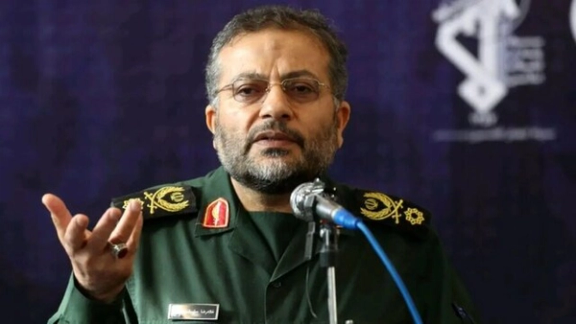
The Islamic Republic of Iran has inflicted the United States' first major strategic defeat in the West Asia region, the commander of the IRGC Basij paramilitary said on Tuesday.

The Islamic Republic of Iran has inflicted the United States' first major strategic defeat in the West Asia region, the commander of the IRGC Basij paramilitary said on Tuesday.
"The defeat of the United States in the contemporary era in the West Asia region was its first major strategic defeat. This defeat was the greatest defeat the United States has faced since its founding," General Gholamreza Soleimani told Tehran media on Tuesday.
Soleimani also said Israel is economically crippled amid the war in Gaza against Iran-backed Hamas, while Iran's largest militia in Lebanon, Hezbollah, continues daily exchanges with Israel. Attacks have also been launched from Iran's militias in Yemen, Syria and Iraq since Hamas's October 7 attacks on Israel last year.
“The Zionist regime has been defeated militarily,” Soleimani said, adding that it is a continuation of the revolution of 1979, which saw the Islamic Republic form and overthrow the monarchy.
Soleimani's remarks come amid widespread blackouts in Iran due to fuel shortages and the severe devaluation of its currency, now worth just 1/10,000th of its value before the Islamic Republic's establishment in 1979. Meanwhile, Iran's regional proxies, Hezbollah and Hamas, have been weakened by recent Israeli attacks.
“The great Iranian nation, during the Islamic Revolution under wise leadership, confronted the deviant Pahlavi regime, stood against the United States, and defeated it,” Soleimani said.
As the propaganda war continues, he called for a global campaign to convince public opinion that Israel’s downfall is imminent.
“The world’s public opinion must be convinced that this regime has collapsed. We must continuously create and disseminate content in the digital space, spreading the message that the Zionist regime has been defeated,” he added.
Soleimani’s remarks come amid ongoing tensions between Iran and Israel in the region. Iran frequently cites the Islamic Revolution of 1979 as a moment of resistance to foreign domination, framing its policies as part of a broader struggle against US military presence in the region and its global influence.
Soleimani highlighted the role of the United States in what he described as the survival of Israel, which he called the “filthy body of the Zionist regime.”
His comments align with Iran’s broader strategy of leveraging anti-Israeli and anti-Western sentiments to strengthen its regional alliances and bolster its narrative of resistance.
While Soleimani painted a picture of an Israel on the verge of collapse this week, in both of Iran's recent aerial bombardments of Israel, Israeli forces, along with international allies, intercepted most of the projectiles launched, challenging claims of a dismantled air defense network.
Meanwhile, in Israel's recent retaliatory attack to the October bombardment, masses of Iranian air defenses were destroyed.
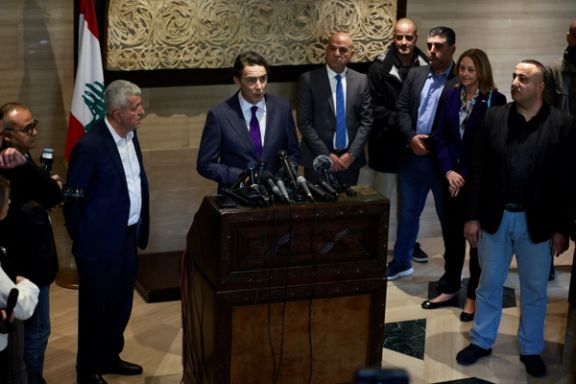
The US envoy to the Middle East, Amos Hochstein, said on Tuesday there is a real opportunity for a ceasefire deal between Israel and Iran-backed Hezbollah.
It comes as Israel continues air strikes deep into central Beirut and Hezbollah, Iran’s largest proxy, fires dozens of projectiles daily into Israel.
Speaking at a press conference in Beirut following talks with Lebanese Parliament Speaker Nabih Berri, Hochstein said that the deal is now within reach."It is now within our grasp. As the window is now, I hope the coming days yield a resolute decision."
He made the remarks just one day day after the Lebanese government and Hezbollah, designated a terror group by the US and multiple other nations, agreed to a US ceasefire proposal, dependent upon revisions.
Hochstein added, ”I came back because we have a real opportunity to bring this conflict to an end... This is a moment of decision-making. I am here in Beirut to facilitate that decision but it's ultimately the decision of the parties to reach a conclusion to this conflict."
A senior Lebanese politician who stands against Hezbollah, who asked to remain anonymous for security reasons, told Iran International the situation looks likely to take time. "I feel that as the discussion goes further than the headline principles they start revealing different interpretations by the various parties which creates complications," he said.
It is also happening outside of the constitutional process which makes it complex from the side of the Lebanese government.
"This is practically a negotiation between Hezbollah and Israel with the Lebanese Speaker of Parliament being a mediator with Hochstein representing one of the parties and not the Lebanese state, which is practically not part of this discussion given that the discussion is taking place outside the constitutional process," he said.
"The fact is, the state was not involved in the war decision and did not engage in such a war. However, the state will have to guarantee the peace."
The deal could be a parting gift from the Biden administration before President-elect Donald Trump comes to office for his second term in January, allowing further peace treaties to be brokered by the next administration.
Speaking on condition of anonymity, a former Israeli diplomat told Iran International, “This will be Trump’s way to get straight down to business. He will want to shore up peace with Saudi and Israel as he needs peace in order to start making money.”
In 2020, Trump brokered historic peace deals between Israel and Arab states including the United Arab Emirates in the Abraham Accords. Israeli Prime Minister Benjamin Netanyahu will be eager to please Trump, the source said, as he too wants to add peace with Saudi, broadening the Abraham Accords, to his legacy.
Israel’s longest serving premier ordered a mission which saw around 1,500 Hezbollah operatives taken out of action in September when two days of pager and walkie-talkie explosions hit the group in the most debilitating operation since its founding.
Just days later, Israel assassinated the head of the group, Hassan Nasrallah, part of a stream of killings targeting Hezbollah’s top chain of command.
Another source in the Israeli government told Iran International that depending on the next stages of the process, Hochstein may make his next stop Israel.
Israel has been fighting against Iran-backed Hamas, designated a terror group by the US, the UK and EU, since the attacks of October 7 last year in which over 1,100 mostly civilians were killed and more than 250 people taken hostage.
On October 8, Hezbollah joined the war on Israel’s northern front and has since fired over 17,000 projectiles into the Jewish state as it battles Iran’s militias from multiple fronts. Iranian militias in Yemen, Syria, Iraq and the West Bank have also joined the campaign against Israel.
As scores of projectiles continued to be fired into Israel amid Israeli strikes in Lebanon, Hezbollah media, Al Mayadeen, quoted political commentator Radwan Aqil as saying, ”We are facing a diplomatic and political juncture led by Speaker Berri and Prime Minister Najib Mikati."
He said the Lebanese side “will not accept any concession that affects Lebanon's sovereignty," stressing that "there is a national consensus, even from the opposition, to refuse to allow the Israelis to violate Lebanese sovereignty."
Israel continues to push for a clause which secures the right to self-defence as the negotiations continue with 63,000 Israelis displaced amid the conflict which has since seen hundreds of thousands of Lebanese forced into shelters.
On Tuesday, while negotiations continued, Al Mayadeen journalist Ali Mortada warned on X: “I told you, Haifa is the future of Tel Aviv,” suggesting the barrage hitting Israel’s northern city will soon be reaching Tel Aviv in central Israel. “If you want to ceasefire we will, if you don’t, we won’t,” he said.
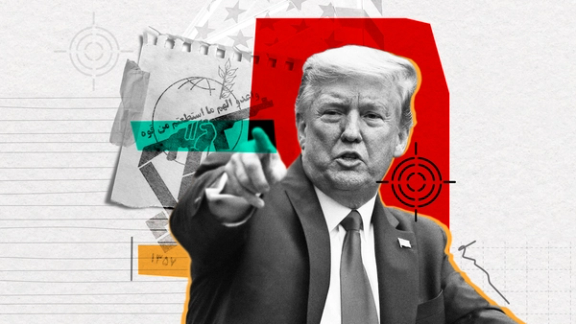
Politicians in Tehran seem optimistic about the possibility of restoring ties with the US after Donald Trump's election victory, with some volunteering to initiate talks regardless of their status and rank.
Ahmad Ajam, a member of the Iranian parliament who secured his seat with a modest share of votes in his constituency, is among those eager for dialogue. He has even proposed including a cease-fire in Gaza and Lebanon as a topic for talks, disregarding the risks faced by higher-ranking politicians who have suggested negotiations with US officials without the prior approval of Supreme Leader Ali Khamenei.
Foreign Minister Abbas Araghchi faced serious backlash after rumors emerged that Iran's chief diplomat in New York, Saeed Iravani, had engaged in secret talks with Trump advisor Elon Musk and even promoted investment in Iran. The hardliner daily *Kayhan*, closely aligned with Khamenei's office, sharply criticized Araghchi and went as far as accusing him of treason.
The news of the meeting, shared with The New York Times by two unnamed Iranian officials, was likely an attempt to gauge reactions from Khamenei and the IRGC, the key power brokers in Iran's government, to see if they would support or oppose the proposal. Critics also accused Araghchi of being complicit with former Foreign Minister Javad Zarif, who negotiated the 2015 nuclear deal, which hardliners claimed primarily benefited the West.
On Sunday, 207 of Iran's 290 lawmakers approved the urgency of a bill calling for the dismissal of officials like Javad Zarif, whose children allegedly hold US citizenship. Iranian media report that the bill is specifically aimed at Zarif within the government.
Amid this, Ebrahim Asgharzadeh, a leader of the 1979 US embassy takeover in Tehran, in which over 50 US diplomats were held hostage, told a Tehran news outlet that "with or without negotiations with Trump, time is against Iran."
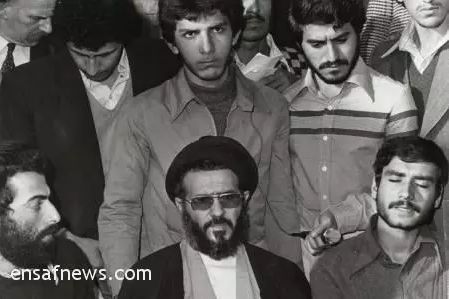
Asgharzadeh emphasized that "only innovative talks on equal footing with the United States can shift the situation in Iran's favor," while noting that "even confidence-building with China and Russia is no longer sufficient to help Iran." Now regarded as a Reformist figure, he reiterated that "dismantling the security net surrounding Iran could potentially end its dangerous isolation and pave the way for the country’s development."
He further warned that "provocative slogans and ambitious claims will surely rally the world's public opinion against us." A good example of such provocations and ambitions was Kayhan’s article that said, "If rumors about the meeting between Musk and Iravani were true, it would have been a dangerous and damaging development that would have undermined Iran's dignity and authority."
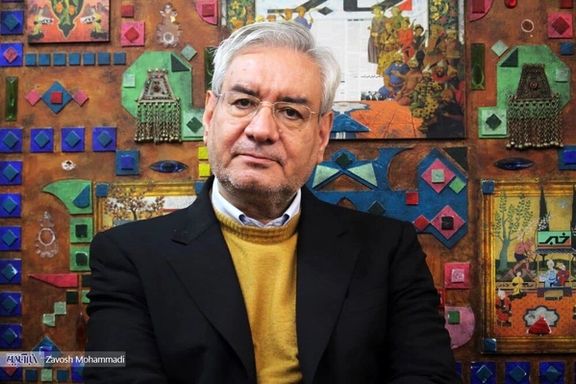
Kayhan previously accused Reformists and centrists in Iran of attempting to portray Trump as having changed since 2016, suggesting that engaging in talks with him could be Iran's path out of isolation. The publication claimed that US administrations are convinced they can extract concessions from Iran by encouraging Iranians to rise against their government, as seen in the numerous protests since 2018.
In his interview, Asgharzadeh warned that time is running out and that persisting with outdated policies will not benefit Tehran. He emphasized that Iran's primary challenge lies with the United States, a conflict he believes poses a threat to the Islamic Republic's very existence. Asgharzadeh noted that in its dispute with the US, Iran adopts a confrontational stance toward a third country, Israel, while simultaneously advocating for the rights of a fourth, the Palestinians.
The reformist figure argued that while Iran claimed President Masoud Pezeshkian's victory in the July election signaled a shift toward change and readiness for rapprochement with the West, the decision to invite Hamas leader Ismail Haniyeh to his inauguration undermined that message.
He observed that Trump aims to establish a new order in the Middle East and cautioned that, under the current circumstances, any action provoking a US military strike on Iran could devastate the country's economy and infrastructure, potentially triggering a domestic revolt. Instead, he advocated for a strategy of creative diplomacy to minimize the risk of military aggression against Tehran.
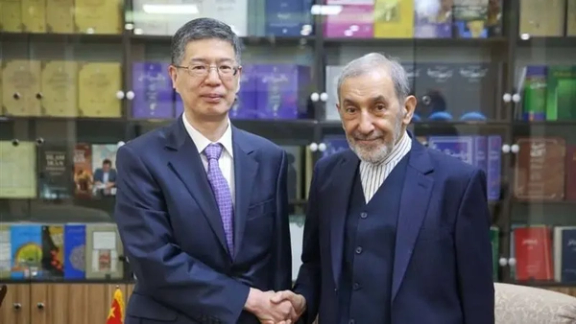
Iran has pledged to strengthen its strategic alliances with China and Russia, dismissing concerns that a potential return of Donald Trump to the White House could alter its foreign policy.
Ali Akbar Velayati, Advisor to the Supreme Leader on International Affairs, reaffirmed the Islamic Republic’s commitment to fostering these relationships during a meeting with Zong Peiwu, China’s Ambassador to Iran.
“The expansion of relations between Iran, China, and Russia in various fields, including frameworks like Shanghai and BRICS, will have significant and lasting effects,” Velayati said Sunday.
Tehran views its partnerships within the BRICS bloc and the Shanghai Cooperation Organization (SCO) as critical tools for countering Western sanctions.
BRICS, established in 2009 by Brazil, Russia, India, and China, added South Africa in 2010 and approved Iran’s membership in 2024.
Similarly, the SCO, founded by China and Russia in 2001, now includes ten members, including Iran, which formally joined in 2023.
Despite optimism about these alliances, criticism within Iran remains. President Masoud Pezeshkian recently called BRICS a talking club, saying that the group has yet to deliver practical solutions against US sanctions.
This frustration highlights a growing gap between Tehran’s aspirations and the tangible benefits of its Eastern pivot.
Nonetheless, Velayati emphasized the importance of these collaborations, pointing to their potential to bolster Iran’s international standing. He framed the partnerships as a cornerstone of Iran’s foreign policy, unaffected by external pressures, including changes in US leadership.
The Trump administration is expected to adopt a harder stance on China, with key figures such as John Ratcliffe, Trump’s nominee for CIA director, labeling Beijing as the primary global threat.
Ratcliffe has warned of China’s ambitions to dominate economically, militarily, and technologically, stressing a US agenda that could complicate Tehran’s growing ties with Beijing.
Velayati’s remarks come as Iranian officials maintain their defiance against US sanctions and pressure.
During Trump’s previous presidency, the United States withdrew from the 2015 nuclear deal, known as the JCPOA, and imposed a maximum pressure campaign. This led to severe economic repercussions for Iran, prompting the country to ramp up its nuclear activities, including enriching uranium to near weapons-grade levels.
Trump’s return has reignited concerns about a revival of these policies. On November 16, the Financial Times reported that the incoming US administration aims to reintroduce maximum pressure to force Tehran into renegotiating its nuclear and regional policies.
Some Iranian officials, however, are urging a more aggressive approach. Ahmad Naderi, a member of Iran’s parliament, criticized the nuclear program for failing to deliver security benefits and suggested that testing a nuclear weapon might be necessary to achieve regional balance.
"I believe we must pursue atomic weapons testing, as no other path remains for us given the lack of regional balance," he added, in an apparent reference to setbacks by Iran's regional proxies.
Velayati’s remarks signal Iran’s intent to remain focused on its strategic alliances while navigating the challenges posed by shifting US foreign policy.
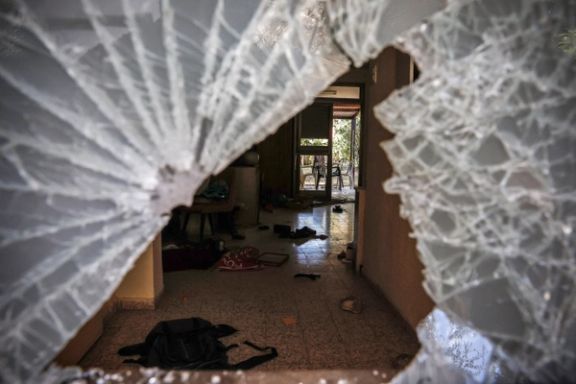
Iris Haggai, who lost both her parents on October 7, is one of several families of American victims, who have sued Iran, equipped with newly – unsealed documents revealing Tehran’s alleged fingerprints on the atrocities.
The victims' families filed the lawsuit against Iran in the US District Court in Washington on November 17. Forty-six Americans were among the more than 1,200 killed during the attack and 12 American citizens were among the more than 250 hostages kidnapped to Gaza.
The suit, which has been reviewed by Iran International, is based on the evidence presented by attorneys for the plaintiffs in what they refer to as secret documents uncovered by lawyer Gary Osen.
“The October 7 Attack, led by Hamas and joined by PIJ, the PFLP and others, was part of a fully coordinated plan, financed and managed by Iran through the IRGC QF, to annihilate Israel by attacking it from multiple fronts simultaneously,” the lawsuit reads.
Documents include a list of payments made by Iran to Hamas leaders over the years and discussions of mutual defense agreement between Palestinian groups, Iran, and its proxies.
The complaint also includes a decision to request the Islamic Republic send Hamas $7 million monthly for mobilization of a planned confrontation.
The lawsuit also alleges that Iran and its proxies planned what they called a big deception before Yahya Sinwar’s “Big Project” with Iran’s Axis of Resistance.
“It appears that Hamas, Hezbollah, and the IRGC pulled off a 'double bluff' in planning the October 7 operation—deceiving Israel by openly stating their intentions in a way that convinced Israel that they were saber-rattling rather than carrying out a concrete plan of attack,” the lawsuit claims.
Ruby Chen's son Itay, 19, was understood to have been held hostage until it was confirmed this year that the young soldier was killed on October 7 and his body taken to Gaza.
For the bereft father, the lawsuit is at least a step to help prevent other families suffering the same tragedy and the chance to broaden a crackdown on terror funding.
"Iran funds a global terrorism financing network which Hamas benefits from. Money to support terrorism raised worldwide is currently 'parking' in various 'charity organizations' in countries such as Turkey, Kuwait, Indonesia and others," he told Iran International.
"The court case is to prevent those funds from being used for future terrorist attacks and deter other countries from funding terrorism."
While the concept of justice seems elusive to the families of the 101 hostages in Gaza, around half believed to be dead, their loved ones' return the only possible compensation, he said there is a bigger mission.
"We would like to see the expansion of the list of terrorist countries to organizations such as financial institutions or charity funds that enable the global terrorist financial network to be blacklisted and enable US victims to sue them as well and be accountable for the money transferred to Hamas and enabled the vicious October 7 attacks," he added.
For Iris, this is about holding Iran accountable and to send a message.
“It’s about making sure we understand the role that the IRGC is playing in all of this. It’s about the October 7th attack that was led by Hamas, but it was also led by the Islamic regime in Iran, who makes sure that Hamas has their weapons, make sure that they operate the same way that the Islamic regime in Iran wants them to operate,” Iris told Iran International.
She lost not only her parents, but 117 people that she knew growing up in Kibbutz Nir Oz were suddenly dead, missing or kidnapped in just one day. Judi Weinstein Haggai and Gadi Haggai, like much of Kibbutz Nir Oz, were pro-peace activists who abhorred war, said their daughter Iris.
On October 7, their morning routine walk in their Kibbutz turned into tragedy.
Judi witnessed her husband being killed. She called medical emergency services, describing in detail what had happened over the phone. Iris said she listened to the recordings. Judi had also been shot by Hamas, and it is not known if she died of her wounds or if she was killed after. Both their bodies are being held hostage in Gaza,
“It's not just about my parents. It's about the whole community. 117 people disappeared from my life in one day,” said Iris.
Iris said the lawsuit has evidence of Iran’s role in October 7 and that she is hoping this will help put the spotlight on that to dissuade Iran from using its proxies as a cover.
The lawsuit could have an indirect or direct impact on the Islamic Republic establishment, Gissou Nia, an international human rights lawyer told Iran International.
Nia, who helped lead the successful campaign to remove the Islamic Republic of Iran from the UN Commission on the Status of Women, said most of the Islamic Republic’s direct assets were seized and have already been paid out.
But she said the impact can sometimes be direct, like in the case of US authorities seizing Iranian flag tankers in open waters. The proceeds from that liquidated tankers go into a fund for US Victims Fund of State sponsored terror.
“But if people evade sanctions, if companies, for example, BNP Paribas, a bank that was doing banking with Islamic Republic of Iran officials and other affiliated entities, if they had to pay a certain penalty to the U.S. government because they were found in violation of that, that's the kind of money that would go into a fund.”
Foreign governments are generally considered beyond the jurisdiction of US courts, but the terrorism exception to the Foreign Sovereign Immunities Act (FSIA) allows the courts to hold these countries accountable, where immunity is not absolute.
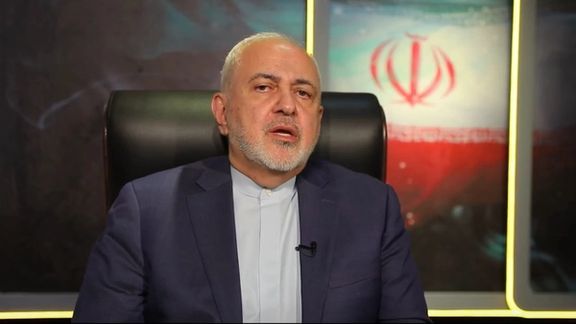
Presidential aide and former foreign minister Mohammad-Javad Zarif accused Israeli Prime Minister Benjamin Netanyahu of undermining the 2015 nuclear deal and fueling regional conflicts, in a rare video message directed at Jews worldwide.
In the Monday video message, published on Zarif’s X and Instagram accounts, the Iranian vice-president for strategic affairs said the deal, officially known as the Joint Comprehensive Plan of Action (JCPOA), “could have been the foundation of a new era of peace, tranquility, regional cooperation, and freedom from threats, conflicts, and escalating tensions.”
“However, before too long, Netanyahu and his Zionist and extremist cohorts succeeded in their satanic effort to rob the region and the world of this historic opportunity, standing on the wrong side of history,” Zarif said. “The agreement would have ensured that the ‘wolf’ this habitual liar was always ‘crying’ about, would never come to town.”
In the video, Zarif appears as a peace-loving, compassionate politician, calling for peace and harmony, while he spent most of his career as a diplomat representing and defending the Islamic Republic's domestic authoritarian rule and aggressive, anti-Israel and anti-West policies.
Over the years, Zarif’s attempts to deny or explain away human rights violations in Iran have led to a lot of attacks by critics who say he has been whitewashing the Islamic Republic’s record. The same can be said about his defense of Tehran’s policies in the region, its role in the Syrian civil war, and support for militant groups in the region.
Back in 2022, Netanyahu called the JCPOA a “horrible agreement because it allowed Iran basically with international approval, to develop a nuclear and basically an atomic arsenal paved with gold, with hundreds of billions of dollars of sanction relief.”
Before Donald Trump withdrew the United States from the JCPOA in 2018, the International Atomic Energy Agency had extensive inspection powers that it used to verify Tehran’s compliance with strict enrichment limits. Since 2019, Iran has responded to US ‘maximum pressure’ sanctions by boosting the nuclear program far beyond JCPOA limits, with some estimates suggesting that the country’s nuclear weapon breakout time is “just a week”.
Zarif’s Monday message seemed to be mirroring Netanyahu's years-long series of videos addressed directly to Iranians. In his latest message released last Tuesday, Netanyahu said Iran's clerical rulers fear their own people more than anything.
"There’s one thing Khamenei's regime fears more than Israel. It’s you – the people of Iran. They spend so much time and money trying to crush your hopes and curb your dreams," he added. "Don't let your dreams die. Don't lose hope and know that Israel and others in the free world stand with you.”
Zarif, who is known as the architect of the JCPOA, is defending the nuclear deal at a time when his government is expressing its willingness to resume negotiations over its nuclear program as US President-elect Trump is expected to restore his so-called maximum pressure policy against Tehran.
France, Britain, Germany, and the United States are expected to introduce a censure resolution against Iran at the upcoming meeting of the IAEA Board of Governors despite Tehran's threats to retaliate, a German foreign ministry spokesperson confirmed to Iran International on Monday.
The decision by the US and its European allies to move forward with the censure resolution comes despite Iran's threat to retaliate if such a resolution is adopted.
Iran allowed Grossi and his team to tour Fordow and Natanz, two key nuclear sites, on Friday apparently in hopes that it would convince the Board of Governors not to move forward with the censure resolution. However, that strategy does not seem to have worked.
“Iran has not fulfilled its obligations under the NPT and Safeguards Agreements. The recent visit of IAEA Director General Rafael Grossi to Tehran has not changed this assessment," the German foreign ministry spokesperson told Iran International.